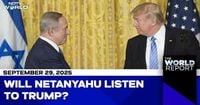In a dramatic turn of events that has sent ripples across the Middle East and beyond, Israeli Prime Minister Benjamin Netanyahu issued a rare public apology to Qatar following a deadly Israeli airstrike in Doha earlier this month. The apology, delivered during a high-stakes three-way phone call brokered by U.S. President Donald Trump, comes at a critical moment as leaders scramble to end the devastating Israel-Hamas war, which has now claimed more than 66,000 Palestinian lives, according to Gaza's Health Ministry.
The September 9 airstrike, which Israel said was aimed at a Hamas negotiating delegation, tragically killed Badr Al Dosari, a Qatari citizen, alongside five members of Hamas. While Hamas’s top leaders survived the attack, the incident sparked outrage in Qatar, with officials condemning it as a “flagrant violation” of the nation’s sovereignty. Qatar’s Foreign Ministry swiftly demanded accountability, calling the strike an unacceptable infringement on its territory and its role as a mediator in the conflict.
The diplomatic fallout was immediate. Qatar has long played a pivotal role as an intermediary between Israel, Hamas, and Western powers, leveraging its regional influence and relationships to broker ceasefires and humanitarian agreements. The attack on its capital, however, threatened to upend this delicate balance, raising questions about whether Qatar would continue its mediation efforts amid such provocations.
According to an official statement from Qatar’s Foreign Ministry, the three-way call on September 30 brought together President Trump, Qatari Prime Minister and Foreign Minister Sheikh Mohammed bin Abdulrahman bin Jassim Al Thani, and Prime Minister Netanyahu. During the conversation, Netanyahu expressed “deep regret” over the loss of the Qatari citizen and pledged that Israel would not repeat strikes on Qatari territory. In a message quoted from Netanyahu’s official X account, he told Sheikh Mohammed, “Mr Prime Minister, I want you to know that Israel regrets that one of your citizens was killed in our strike. I want to assure you that Israel was targeting Hamas, not Qataris.”
For Qatar, the apology was an important—if incomplete—step. Sheikh Mohammed thanked President Trump for his mediation and for Washington’s commitment to Qatar’s defense partnership. Yet, he reiterated Qatar’s “absolute and unequivocal rejection” of any infringement on its sovereignty, making clear that Doha would not tolerate further violations. Despite the tension, Qatar reaffirmed its commitment to supporting diplomatic efforts to end the conflict and to upholding its role as a trusted mediator. As officials in Doha put it, the nation remains steadfast in its pursuit of peace, even in the face of such adversity.
The apology and diplomatic maneuvering unfolded against the backdrop of a war that has devastated Gaza for nearly two years. As of September 29, Gaza’s Health Ministry reported that the death toll in the Israel-Hamas war had surpassed 66,000 Palestinians, a staggering figure that underscores the urgency for a resolution. The human cost of the conflict has been a constant refrain in international calls for a ceasefire, with images of destruction and loss fueling outrage and despair across the globe.
It was in this context that President Trump and Prime Minister Netanyahu announced a sweeping new plan to end what they called “their genocide in Gaza.” On September 29-30, Trump unveiled a 20-point peace proposal designed to bring about an immediate ceasefire and lay the groundwork for a post-war governance structure in Gaza. The plan, which Netanyahu endorsed during their Washington meeting, would establish a temporary governing board to oversee Gaza’s transition, chaired by Trump himself and including former British Prime Minister Tony Blair.
The proposed governing board is intended to manage Gaza’s recovery and political future, providing oversight and international legitimacy during a sensitive transitional period. Notably, the plan does not require population transfers—a contentious issue in past negotiations—and calls for an immediate ceasefire if both sides accept the terms. For many observers, this represents a significant shift from earlier proposals that had failed to gain traction.
Sina Azodi, an assistant professor of Middle East Politics at George Washington University, described the 20-point plan as “a win for everybody,” according to Reuters. The sentiment reflects a cautious optimism among some analysts that the new framework, with its emphasis on international cooperation and inclusive governance, could break the deadlock that has stymied previous peace efforts. Still, uncertainty remains over how Hamas will respond to the proposal, and whether all parties will be willing to make the necessary compromises.
President Trump’s involvement in the peace process marks a notable return to high-profile international diplomacy. By positioning himself at the center of the proposed governing board, Trump aims to leverage his influence and relationships with key stakeholders to shepherd the process forward. The inclusion of Tony Blair, with his experience in Middle East negotiations, is seen as an attempt to bolster the board’s credibility and balance U.S. leadership with broader international input.
The announcement of the peace plan and the apology to Qatar have been met with a mixture of hope, skepticism, and political calculation across the region. Israel, for its part, has longstanding grievances with Qatar, ranging from its support for the Muslim Brotherhood and its influential news network Al Jazeera, to what Israeli officials see as support for anti-Israel sentiment on college campuses. Nonetheless, Netanyahu’s willingness to apologize for the airstrike and to endorse the U.S.-led peace proposal suggests a recognition that diplomatic engagement with Qatar remains essential to any lasting solution.
Qatar, meanwhile, finds itself in a delicate position. As a small but wealthy Gulf state, it has managed to carve out a unique role as a mediator, often bridging divides between adversaries. The attack on Doha tested this role, but Qatar’s response—demanding respect for its sovereignty while recommitting to peace efforts—signals its determination to remain at the center of regional diplomacy. Sheikh Mohammed’s gratitude to Trump for his mediation, coupled with his insistence on Qatar’s rights, reflects the balancing act that defines Qatari foreign policy.
As the world watches to see whether the new peace plan gains traction, the stakes could hardly be higher. The nearly two-year war in Gaza has inflicted immense suffering and destabilized the region, with ripple effects felt far beyond the immediate conflict zone. The coming days and weeks will reveal whether the latest diplomatic overtures—anchored by an unprecedented apology, a bold U.S.-sponsored proposal, and the continued efforts of regional mediators—can finally bring an end to the bloodshed and chart a course toward a more stable future.
For now, the eyes of the world remain fixed on Washington, Doha, and Jerusalem, as leaders grapple with the immense challenges of peacemaking in a region scarred by decades of conflict and mistrust.




